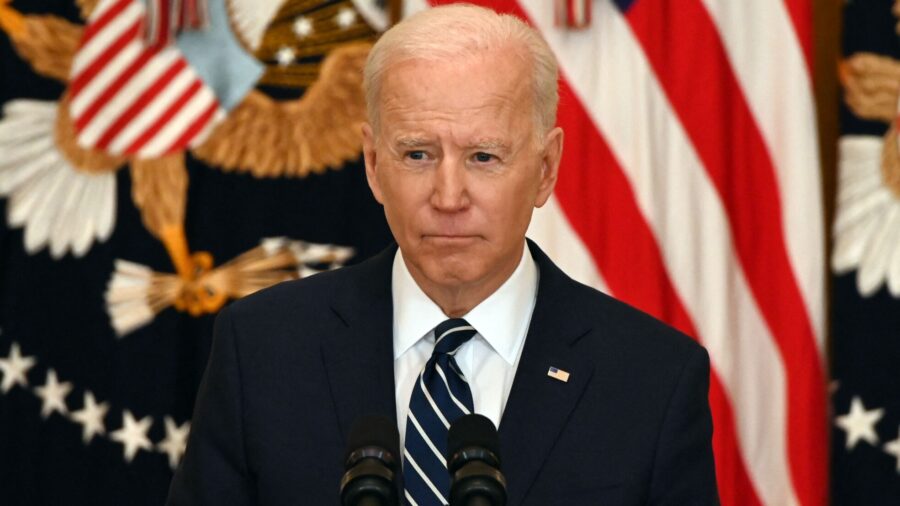WASHINGTON—President Joe Biden has unveiled his ambitious infrastructure package, which proposes substantial tax increases on U.S. corporations to pay for the $2 trillion price tag. However, experts say the economic harm from an increase in corporate taxes will offset the benefits created by the infrastructure investment, raising skepticism about the plan.
Biden described his proposal as “the largest American jobs investment since World War II” in a speech in Pittsburgh on March 31.
By spending on infrastructure, Biden pledges to create millions of well-paying jobs, expand the economy, and make the United States more competitive vis-a-vis China.
The eight-year infrastructure plan will be fully paid for by tax increases on U.S. companies spread over 15 years. Increasing the federal corporate tax rate to 28 percent from 21 percent is one of the several ways proposed in Biden’s infrastructure plan.
Studies, including ones conducted by the Congressional Budget Office (CBO), however, show that raising taxes would lead to less investment, less productivity, fewer jobs, and lower wages.
The administration has to make the case for tax increases as “the benefits of the Biden infrastructure plan won’t outweigh the cost to the economy of the tax increases,” Scott Hodge, president of the conservative-leaning think tank Tax Foundation, said in a report.
“Federal investment financed by debt or taxes could do more economic harm than good because federal borrowing and taxes crowd out private investment,” Hodge wrote.
To avoid harming the economy, he said federal investments should be financed through cutting spending in other discretionary programs.
The CBO models, for example, show that federal investment financed by an increase in taxes would lead to lower economic output and personal consumption.
Increasing the corporate tax rate to 28 percent would raise the U.S. federal-state combined tax rate to 32.34 percent, according to the Tax Foundation. This increase will make the U.S. corporate tax rate the highest in the OECD, reducing U.S. competitiveness. The average corporate tax rate among the OECD countries, excluding the United States, is 23.4 percent.
“What we’re talking about is just raising it to a rate that is lower than it has been through the vast majority of the time—over the last 70 years,” White House press secretary Jen Psaki said at a press briefing on April 1.
She defended the corporate tax hikes saying that 91 of the Fortune 500 companies paid no federal taxes in 2018.
“That is not something that the American people believe is fair, that we believe is fair, and what we’re talking about here is making adjustments to the tax code to make it more fair,” Psaki said.
The infrastructure plan imposes a 15 percent minimum tax on large corporations’ book income to ensure that large companies such as Amazon don’t avoid paying U.S. federal taxes. It also eliminates certain deductions and credits for the fossil fuel industry.
“The statutory corporate tax rate in the U.S. today should be contextualized with the average in other countries, which has fallen over the past 30 years,” Garrett Watson, senior policy analyst at the Tax Foundation, told The Epoch Times.
“The rate that prevailed 50 years ago would not matter in that context,” he added.
The White House isn’t only proposing to increase the corporate tax rate; it’s also pitching $800 billion to $900 billion in additional taxes on companies through other methods, Watson said.
The tax-code overhaul of 2017 reduced corporate tax receipts by about 0.1 percent of gross domestic product (GDP), he said, but Biden’s infrastructure plan raises them by six times as much to 0.6 percent of GDP.
Business groups, including the U.S. Chamber of Commerce, applauded the Biden administration for making infrastructure investment a priority but strongly opposes the tax increases.
The Chamber stated on Twitter, “The proposal is dangerously misguided when it comes to how to pay for infrastructure.
“We strongly oppose the general tax increases proposed by the administration, which will slow the economic recovery and make the U.S. less competitive globally.”
Senate Minority Leader Mitch McConnell (R-Ky.) on April 1 denounced the proposal and pledged to fight the plan “every step of the way.”
Republicans also criticized the plan for not heavily focusing on infrastructure.
“Less than 6 percent of this massive proposal goes to roads and bridges. It would spend more money just on electric cars than on America’s roads, bridges, ports, airports, and waterways combined,” McConnell said in a statement on March 31.
Biden’s infrastructure plan allocates just $115 billion for repairing and rebuilding bridges, highways, and roads.
From The Epoch Times


